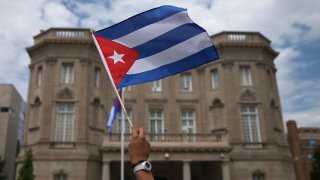
At least one Molotov cocktail was thrown at the Cuban Embassy in Washington, but there was no significant damage and no one was injured. U.S. law enforcement officials were investigating.
Secret Service officers were called around 8 p.m. Sunday to respond to the attack on a busy street in the Adams-Morgan section of the city. Embassy officials reported that someone had thrown a “possible incendiary device” at the building, Secret Service spokesman Anthony Guglielmi said on Monday.
There was no fire or significant damage to the building, he said. No arrests had been made.
We've got the news you need to know to start your day. Sign up for the First & 4Most morning newsletter — delivered to your inbox daily. Sign up here.
Cuban Foreign Minister Bruno Rodriguez said on the X social media site that the Cuban Embassy “was the target of a terrorist attack by an individual who threw 2 Molotov cocktails,” a type of crude grenade made from a bottle filled with flammable liquid and a wick that's lit just before it's thrown. He said no one was injured. A spokesman for the Cuban Embassy did not immediately respond to a request for additional information on Monday.
In 2020, a Cuban man who sought asylum in the U.S. opened fire with an AK-47 at the Cuban Embassy, spraying the front of the building with nearly three dozen rounds. Authorities said the man told them he opened fire because he wanted to “get them before they could get him."
The shooting left bullet holes in the glass around the embassy's door, and bullets pierced the bronze statue of Jose Marti, the Cuban writer and national hero, as well as the columns and facade of the building.
Local
Washington, D.C., Maryland and Virginia local news, events and information
Cuba built the embassy in 1917. It closed in January 1961 as Cold War tensions between the two countries escalated, and it reopened as an “interests section” in 1977. In July 2015, it became an embassy again as the two countries restored relations under President Barack Obama and President Raul Castro.
The embassy is on a busy street between the embassies of Poland and Lithuania.
___
Balsamo reported from New York.



